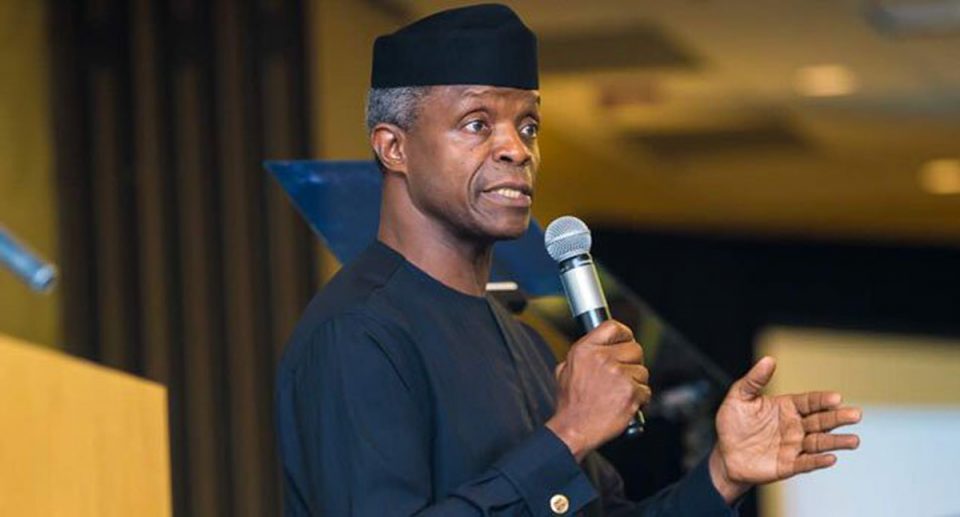Vice President Yemi Osinbajo has described the Nigeria Deposit Insurance Corporation (NDIC) as a reference point for deposit insurance globally.
Osinbajo expressed this view in his address at the 30th Anniversary, Public Lecture and Book Presentation of NDIC on Monday in Abuja.
The topic of the NDIC 30th anniversary celebration was “Emerging Risks and Corporate Governance Issues in Banking.’’
The vice president said that the various institutional achievements of the NDIC in the past three decades of its existence were of note.
“The part that it has played in stabilising the financial system, especially the periods immediately after the early days of privatisation and private ownership of banks and its role in the failed banks crisis that followed immediately after.
“The various professional and standards distinctions that it has received through the years.
“Few will deny that even its mere existence has reassured sometimes nervous system that banks will be able to convert liabilities to cash to fulfill their potential obligations to their customers.
“ I must also join others in commending the NDIC through the years for its professionalism, its steady unexcitable and conservative profile and for gaining international respect amongst peers for itself and for Nigeria.
“Not only are you a reference point for deposit insurance institutions globally but also NDIC officials have been preferred to Executive Council (EXCO) membership of the highly respected International Association of Deposit Insurers (IADI), as well as the current Chairmanship of the IADI-Africa Regional Committee (ARC).’’
He said NDIC had continually demonstrated that it was an institution that deserved all of the accolades and commendations that it had continued to receive.
Osinbajo, said, however that it was important to mention some of his perceptions on some of the dynamics of engaging the future of our financial safety systems.
He said that the number of institutions, and implicit and explicit tools in our safety system and their sustainability.
The vice president said that the most significant challenge the financial system had experienced so far was that of bank crisis of 2009.
He said that going by the manner of resolution it appeared that the preferred option was the establishment of AMCON.
“ An option that cost something in the order of N5 trillion; since then we have also seen the use of a mixture of bailouts and bridge banks.
“The problem of course is that the most reliable studies show that overly generous financial safety nets or system have generally tended to increase bank risks and systemic fragility.
“ My respectful view is that there must be some rethinking of the short and long term implications of the use of these tools and their sustainability in the coming years.
“A reference was made in the past that we may not even have that option of the AMCON-type bailout given the sheer amount of money that will be involved.
“The other issue is coping with the implications for banking of the disruptive technologies that are quickly changing the landscape of financial services.
“ It seems to me that FINTECHS will continue to be most profound force for change for both good and ill ever seen in the financial services industry,’’ he said.
Earlier in his welcome address, Alhaji Umaru Ibrahim, the Managing Director and Chief Executive Officer of NDIC, said that the bank creditably acquitted itself over the years.
He said that gathering was to celebrate the success of NDIC in delivering on its mandate in the last 30 years.
Ibrahim said that the book “Thirty Years of Deposit Insurance’’ documented the corporation’s modest beginning and achievements over the period.
The managing director said that in first decade of its existence, the NDIC was saddled with the enormous responsibility of managing distress in the banking system.
Umaru said that the second decade of the bank’s evolution was defined by its responses to regulatory challenges of bank consolidation policy of 2005.
“The NDIC Act was amended in 2006 to strengthen the corporation’s powers to execute its mandate more effectively; however, some experience since 2006 have necessitated the need to review the Act by the National Assembly,’’ he said
Umaru said that NDIC also extended deposit insurance coverage for micro-finance banks and primary mortgage banks.
The Guest Speaker, Mr Aigboje Aig-Imoukhuede, founder and Chairman of Coronation Capital Nigeria Limited, said that if corporate governance and risk management were not properly managed, it would lead to bank failure.
He said that was a need for a department in CBN for operations and technology risk.
The high point of the event was the unveiling of the book “ Thirty Years of Deposit Insurance’’ which was performed by the vice president.




